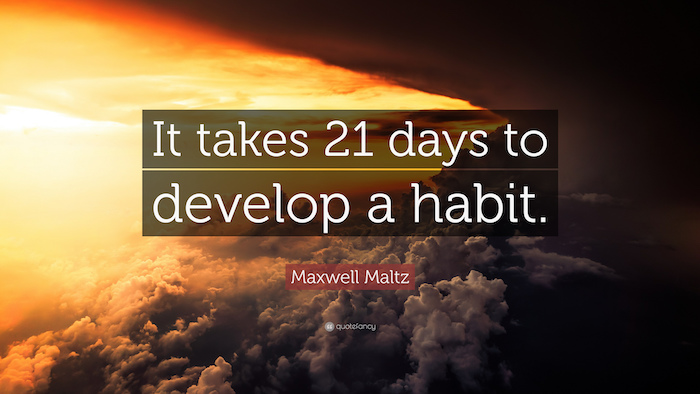Whether it’s biting your nails or eating unhealthy foods, bad habits are a part of life. While not all habits are bad, it can have negative implications in your life if it is not managed properly. They make us become unhealthy and unproductive. If you struggle with a bad habit, you may know you want to break it but are not sure how. Let’s take a look at just how long it can take to break a bad habit.
The 21-Day Myth

In 1960, author and plastic surgeon Maxwell Maltz released a book called Psycho-Cybernetics. In this book, Maltz suggested that people can take around 21 days to get used to:
- Different facial features after plastic surgery
- The absence of a limb after amputation
- A new house they have just moved into
So what makes the 21-day timeframe such a myth? For starters, Dr. Maltz relied on patient reports instead of scientific evidence to support his timeframe. On top of that, none of his patients had a bad habit they were trying to break. Instead, his patients were getting used to something new instead of trying to lose something old. The reality is that there is little evidence since Dr. Maltz published his book to support the 21-day theory. At best, this answer has become popular thanks to Google.
The 2009 London Study
One of the best-regarded scientific studies that set out to prove or disprove the 21-day timeframe was in 2009. The University College of London recruited 96 people who were interested in forming a new habit such as eating a piece of fruit or running 15 minutes daily. Each day during the course of the study, participants were asked if they performed their chosen behavior and how automatic it felt. Ultimately, it took around 66 days on average to have their chosen behavior become automatic and a “habit.”

However, there was definite variation in the results with time frames ranging from anywhere between 18 to 254 days to form a habit. That’s far from the 21 days Dr. Maltz believed in. That’s unsurprising, as someone who may have chosen to drink a glass of water each day could have made it a habit much more quickly than someone who wanted to run 30 minutes after waking up.
Why the London Study Is Important
So what makes the London study one of the most cited around the topic of bad habits?. Psychologist Timothy Pychyl said it best when he explained that breaking a bad habit is really a means of establishing a new habit. He further explains that the old bad habit will always exist but becomes less dominant in favor of the new, more favorable habit.
In his view, swapping a bad habit for a good one can take upwards of six months, and that is only if you are completely committed and practice the new habit regularly. Pychyl cites his own example of it taking two years to learn to floss his own teeth daily, which broke the bad habit of avoiding floss for years prior to that.
Breaking a Bad Habit Can Depend on Three Factors

One of the best insights into what you need to do to break a bad habit comes from University of Oregon professor Elliot Berkman. In his view, breaking a bad habit requires three factors:
- The first is the availability of an alternative habit, similarly to what Timothy Pychyl also noted above. Berkman believes that breaking a bad habit is much easier when you have an alternative habit to immediately replace it with.
- The second is finding the appropriate motivation to change the bad habit. Anyone who wants to break the bad habit will be able to change their behavior faster than someone who is not motivated.
- The third and arguably most important factor is the mental and physical belief that you can break the habit. Longtime habits have become a central part of your identity, and breaking those requires a powerful mental belief that you can and/or should break the habit. The reality is that everyone can break a bad habit when they find the right motivation to make a change. They also need to be aware of the habit. For example, someone who bites their nails might do it unconsciously and not know until someone points it out.
Do Not Rush to Break a Bad Habit
With no universally agreed upon timeframe to break a bad habit outside of the 2009 study, the time frame is less important than the how. Given that, you should not rush and nor put a timetable on breaking a bad habit. If you give yourself 60 days to break a bad habit but haven’t broken it when that time expires, does that mean you won’t ever be successful? What if it would have taken 65 days? It’s an impossible question to answer. Asking yourself how long to break a bad habit is the wrong question. Instead, focus on replacing the bad habit with a different, more positive one, and you will likely find that you end the bad habit faster than expected.
Breaking a bad habit may also come down to consequences and motivation. If a doctor were to tell you that you need to eat healthier to lose weight, you’ll take that as motivation. If a doctor were to tell you that unless you lose weight, you won’t live to see your 50th birthday, you’ll be incredibly motivated. It’s a dramatic example but shows what motivation can do and why it’s more important than any timetable.
Can a bad habit be broken quickly? In extreme cases, the answer is likely yes. If you almost get hit by a car while texting and walking, you may break that habit really quickly. This only applies in extreme scenarios. Instead, focusing on exchanging the bad habit for a good one is the best and fastest way to finally break a bad habit.
To start, you may want to read the “The Power of Habits” book or make use of Habitica to help you out.
